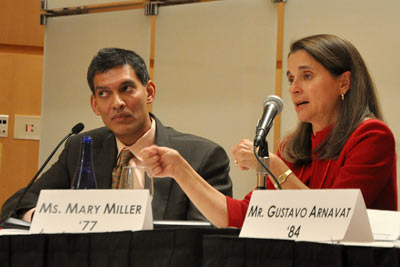Global recovery on track but challenges remain, says panel
By Molly Nevola

Our nation has recovered considerably from financial instability caused by the 2008 financial crisis, but as challenges remain, the most important thing for our country to do is restore confidence in the economy and financial markets, according to Mary Miller '77, undersecretary for domestic finance at the U.S. Department of the Treasury.
She was part of an expert alumni panel of economists April 24 at the Ronald Reagan Building and International Trade Center in Washington, D.C., that explained the complexities of the current global financial state. The event , "A Legacy of Debt and the Future of Global Recovery," was hosted by Cornell Wall Street -- its first event in Washington, D.C. -- and moderated by Eswar Prasad, the Tolani Senior Professor of Trade Policy at Cornell and a senior fellow at the Brookings Institution.
"We cannot live through the dark days of the crisis and not have some form of response," Miller said. "I am heartened by the progress we've made on financial regulatory reforms and recovery but conscious of what we have to do."
The United States is in a safer, sounder place, she said, but there is now a great deal more caution in markets.
The panel also addressed emerging foreign markets and how their economies faced financial crises. M.G. Sri-Ram Aiyer, Ph.D. '69, director emeritus of the World Bank's Korea Department, East Asia and Pacific, noted that Asian economies took bold measures in the first few weeks of their crises in the late 1990s.
Countries like Korea and Malaysia that passed structural reforms were out of crisis by 2000, he said, and have since boasted strong economies and sound policies.
"Foreign markets have stayed out of it by being prudent," Aiyer said. "The United States, on the other hand, learned a lesson."
Gustavo Arnavat '84, executive director of the U.S. Inter-American Development Bank, offered expertise on Latin America, noting that the region has done much better than predicted in 2008 due to reforms and access to capital.
Over the decades, Arnavat said, many "silly policies" led to high inflation, poverty and fiscal imbalances, but careful reforms reversed these numbers. "What doesn't kill you, makes you stronger," he said.
Intrinsically linked to the role of emerging markets in the economy is the role of the G20 summits, which began in 2008 in response to the financial crisis.
According to Johannes Linn, M.A. '71, Ph.D. '73, a nonresident senior fellow at the Brookings Institution, the summits reflected a positive shift in global governance that resulted in emerging markets getting a seat at the table in setting the global economic agenda.
"It was critical in averting a depression that could've been on the scale of the 1930s. Leaders reinforced each other in a joint stimulus package, which was never before seen in history," Linn said.
While the United States has recovered a great deal of ground recently, it still faces major challenges, according to Miller.
"Economic recovery will go some distance toward helping the debt metric; the key is getting a longer term plan in place," she said. "We cannot take anything for granted."
Molly Nevola is a freelance writer in Washington, D.C.
Media Contact
Get Cornell news delivered right to your inbox.
Subscribe